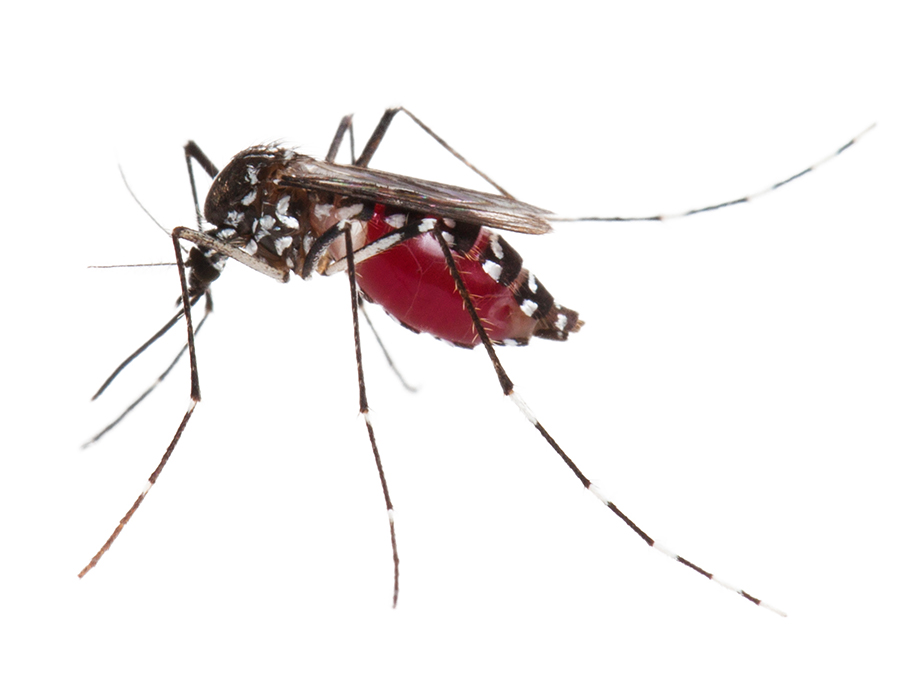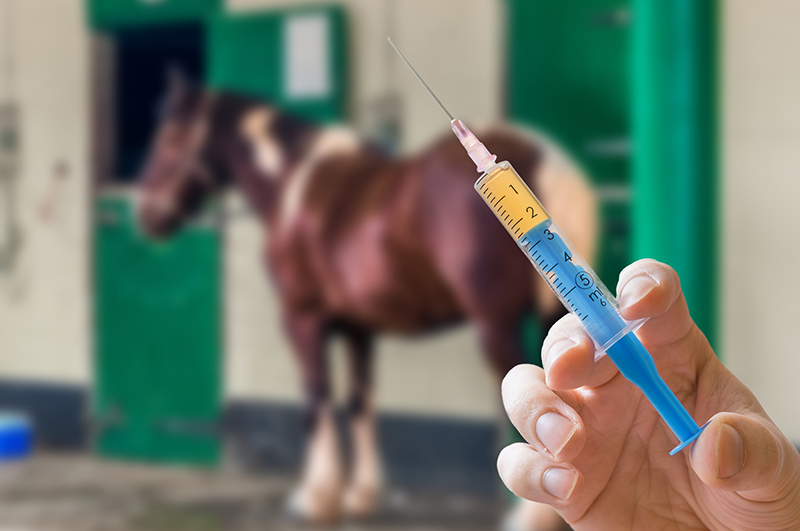Vaccinations
Vaccination Guidelines:

Depending on the disease, vaccines are given once or more a year, and may be given as an intramuscular injection or an intranasal spray. Some horses have “reactions” to the vaccines – often described as getting a stiff neck or lump after vaccinations. Uncommonly we see an anaphylactic reaction where the horse may collapse and require intensive treatment. Some degree of inflammation after vaccination is expected, as all vaccines contain an irritant so that the body will recognize them. Mild reactions consisting of a stiff neck or lump can be handled by giving the horse an anti-inflammatory before vaccination, and possibly the day after. Severe anaphylactic reaction to a vaccine usually means that horse will not be vaccinated with that particular product again. Severe reactions are not common with current vaccine products.
Current diseases that we vaccinate horses in our area for:
Rabies
A neurologic disease caused by the rabies virus. Signs include behavioral changes and progressive signs of paralysis, but signs can vary from case to case. Rabies is always fatal, no treatment exists, and any human that is exposed to a rabid animal should have post-exposure treatment. Raccoons and bats are common carriers of the disease – in 2010, there were 269 rabid raccoons found in Nassau County. Vaccination is performed with an intramuscular product, given yearly. Unlike in dogs and cats, there is no vaccine labeled for use every three years in horses.
Eastern/Western encephalomyelitis
Neurologic diseases caused by viruses and transmitted by mosquitoes that result in variable signs including weakness, behavioral/mental changes and paralysis. If infected, treatment is supportive, and the majority of cases of Eastern encephalitis result in death. Vaccination for these diseases is usually given in combination with a tetanus vaccination, an intramuscular product that is given once a year. If a horse will be traveling to a warmer climate during the winter, a fall booster is recommended as the mosquito season is longer in the South.

Tetanus
Caused by a bacteria, Clostridium tetani, that is found in the soil and can enter the body through wounds. Clinical signs of disease are muscle stiffness and spasm that proceeds to a “sawhorse” stance, and the inability to move, chew or swallow. Treatment for tetanus is intensive and often unsuccessful. Horses are particularly sensitive to this bacteria, and require more frequent vaccination than humans. Vaccination is with an intramuscular product, given yearly in combination with the Eastern/Western encephalitis vaccine. If your horse suffers a wound and it has been six months since the last vaccination, a tetanus booster will be given as a precautionary measure.
West Nile Virus
A neurologic disease caused by a virus and transmitted by mosquitoes that may result in fever, weakness or paralysis, and other signs of neurologic disease. There is no specific treatment for West Nile Virus other than supportive care. To reduce the likelihood of exposure, areas of standing water should be removed from farms (tires, buckets that are allowed to fill and then not used, etc). Vaccination is with an intramuscular product, given in the spring (before mosquito season). Horses that travel to Florida or other Southern climates should be given a booster in the fall because the mosquito season is longer in the South.
Potomac Horse Fever
Caused by a bacteria carried by freshwater snails and small insects (caddis flies, for example), this disease is characterized by fever, colic, diarrhea and laminitis. This disease was initially discovered in the Potomac River valley of Maryland, and is not found throughout the US. The horse is exposed when it ingests insects that are carrying the bacteria. Treatment includes antibiotics to kill the bacteria, and supportive care for the signs of diarrhea and laminitis. Vaccination for Potomac Horse Fever is an intramuscular vaccine given in the spring.
Influenza/ Rhinopneumonitis
Influenza and rhinopneumonitis are contagious upper respiratory conditions that cause fever, lethargy, cough and nasal discharge. Rhinopneumonitis (also known as equine herpes) can also cause abortion in pregnant mares, and there is a specific strain that can cause neurologic disease. The upper respiratory signs are treatable but during infection the horse is very contagious and infections can quickly spread through entire barns. There is no vaccine for the strain that causes neurologic disease. Vaccination for these diseases is usually given twice a year, as the vaccine does not give good coverage for a full year.
Strangles
Caused by a bacteria, strangles affects the lymph nodes of the upper respiratory tract. This disease is very contagious and spreads from horse to horse by way of respiratory secretions and contaminated buckets, halters, and horse handlers. Common signs of a strangles infection are high fever, enlarged or draining lymph nodes on the head, and thick white nasal discharge. Horses may be reluctant to eat due to pain from the swollen lymph nodes, and weight loss can be seen. Infected horses should be isolated so that the disease can’t spread to others in the barn. Treatment consists of anti-inflammatories to help reduce fever, antibiotics and possibly lancing swollen lymph nodes. Vaccination should be done yearly with an intranasal product.
Overall, vaccinations are an important part of your horse’s preventative care. At vaccination time we also check each horse’s teeth and note if dental floating is recommended. This is also a good time to submit a fecal sample for exam to check that your deworming program is effective.


